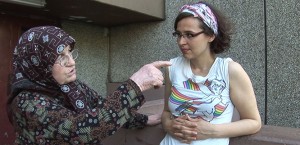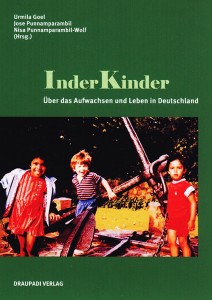When I first heard that the Jewish congregation of Pinneberg is giving “church asylum” to a Muslim, I had to chuckle. The article about it in the online magazine Migazin put the words “church asylum” in quotation marks and used a picture of the dome of the synagogue on Berlin’s Oranienburger Straße – making the linking together of the three monotheistic religions appear intentional.
But now I heard from a friend that there’s a film about the Kiddush asylum at the Pinneberg congregation for a man from the Sudan, and I had to wonder why “church asylum” isn’t “synagogue asylum”.
The Kiddush is a blessing spoken over a goblet of wine at the beginning of a holy day, in order to sanctify the day. Church asylum, as I learned from the film, is actually about a sacred room that protects people who are under threat. The Jewish congregation in Pinneberg has one such room. And it is encouraging to hear – as the head of the congregation explains in the film – why they are using this space to protect a person, at least temporarily, from persecution.
Rosa Fava, director of the “Diversity in Schools” project

Canan Turan with her grandmother
© Adriana Uribe
In our series of events “New German Stories” we present different perspectives on the immigration country Germany. That immigrants from Turkey, Vietnam, Poland, India and Cameroon and their descendants have stories to tell is nothing new—the novel twist is, that they present them here as German stories. On Tuesday, 8 July, director Canan Turan will be a guest of the Academy of the Jewish Museum. In her film KIYMET, she tells the story of her grandmother, who migrated to Berlin from Turkey in the early 70s. We asked Canan three questions about her project:
How did the idea to make a film about your grandmother Kıymet come about? → continue reading
Dealing Creatively with Ethnic Classifications

Book cover
© Draupadi Verlag
Tomorrow at the Academy of the Jewish Museum Berlin, Urmila Goel and Nisa Punnamparambil-Wolf will introduce the book they edited, InderKinder – Über das Aufwachsen und Leben in Deutschland (Indian-Children: on Growing Up and Living in Germany, published by Drapaudi Verlag). It’s the third in a series of events on “New German Stories” where, with the aid of individual biographies, we examine Germany’s historical and current status as an immigration society. On this occasion we’ll focus on the children of immigrants from India, who gained public awareness for the first time during the “Green Card” campaign of 2000.
Prior to the reading and discussion tomorrow, we asked the two editors, Nisa Punnamparambil-Wolf and Urmila Goel, three questions:
What made you choose this title?
We’re referring with this title to the marginalizing “Kinder statt Inder” (children instead of Indians) campaign of the year 2000. The wordplay of InderKinder (Indian-children) is meant ironically: it was important to us to find a creative way to deal with these attributions. With the book, we want to show the varied ways that people who grew up and live in Germany handle the classification of being a child of Indian immigrants.
The book consists of two parts, autobiographical stories and essays. How would you explain your concept?
→ continue reading

